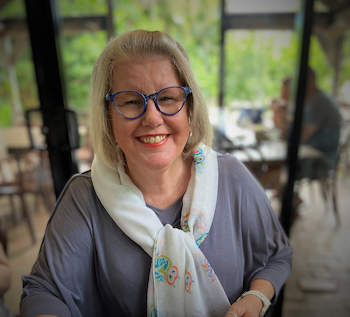Dating after the loss of your wife, husband or partner

By Shirley Cunningham, a blood cancer support coordinator and the Leukaemia Foundation’s National Grief Lead
This topic, dating after the loss of your life partner, may not be one every reader is ready to hear about, so I apologise to those who might find this a sensitive subject.
One of the worst things possible has happened – you have lost your life partner.
According to the Holmes and Rahe Scale of major stressful life events, losing a spouse is rated the most stressful1. You are in mourning, you may not feel like eating, sleeping, or leaving your house.
You are overwhelmed by grief, and then, not too far in the future, friends may start to ask, “when are you going to date?”, or “isn’t it time you started getting out and meeting other people?”.
This is often more about them than you. They want you to be ‘happy’, thus alleviating their discomfort.
But this is not always the case. Dating after the death of a spouse causes strong mixed emotions, and at the top of them often is guilt. What would my partner think? What will my friends and family think? What will my children think?
Loneliness is often the deciding factor in seeking out new companionship. This is something I hear all the time in my counselling role. People feel so alone, especially in the evenings and during the night. They miss sharing life with their partner and the intimacy that comes from being with someone over many years.

The latest data from Pew Research on remarriage, from 2018, indicates that men are more likely to remarry after the loss of a spouse more than women2. There are many reasons for this I believe and that’s a subject that cannot be effectively covered at this time, in this article.
I have been working with bereaved clients for nearly 20 years and dating after loss is not always discussed openly, for many reasons, including others’ expectations, i.e., family and friends not understanding or questioning the reasons, fear of rejection, guilt, and disloyalty to the loved one lost; the person who has been the love of their life, in some cases, for decades.
When a beloved wife, husband or partner dies, the one left behind from the relationship may have had no need to wonder or to be interested in dating other people. Dating is a daunting process and more so when you are bereaved and have all the mixed emotions that come with it. The following are examples of people who have decided to look for a new relationship.
I counselled a gentleman who lost the love of his life and was lost and heartbroken. They had worked together in their business, had raised their children, and were looking to spend more time together travelling. Then his wife was diagnosed with acute myeloid leukaemia and died three weeks later. How does one survive without the friendship and love of his soulmate? In the beginning, dating was not even on his mind, but as time passed and he had begun to heal, he wanted to pursue the possibility of dating… but where to start? He decided to go online, and after much trepidation he met a lovely lady for a coffee. It turned out that this first experience was very hard. He felt out of his depth, he felt awkward, this lady was nothing like his wife, and his emotions were very mixed. But he persevered. After a few more coffee dates, he met a woman who also was widowed and they progressed their friendship to a more romantic relationship. This relationship lasted 18 months and though it didn’t end up in marriage, it showed him he could love again, and to trust there would be someone out there for him.
Another gentleman had been married to his wife for 40 years and she was his first love. His grief was vast. He felt lonely and although his family and friends were there to support him, he still felt alone. It was a good friend of his who asked if he would like to go on a bike ride. He had been a cyclist early in his marriage, but as life took over and became busier with children, he had stopped riding. Now he thought he had nothing to lose by going on an overnight bike ride. So began his rekindled love of cycling. He went on rides regularly and some would be over several days. The group he rode with was mixed and it was here that he met a lovely lady who shared his love of riding and who also understood his grief. She, too, had lost her husband a few years ago. They began dating and the relationship flourished.
If you are thinking about embarking on dating, here are some things to consider:
- Is this the right time? The new person should not be expected to replace the dead wife/husband. This is a brand-new relationship. You need to understand it is possible to be happy in a new relationship, even when you are having thoughts and feelings for a deceased spouse. The new relationship will be different, and just as your relationship with your spouse was unique, this too can be unique if you are open to it.
- Start with baby steps. Meet for coffee and get to know the person before sleeping with them. Join a group or pursue something you are interested in that has membership by both sexes.
- If you have been in a loving and supportive relationship, you know what a good relationship looks and feels like. That is an advantage when dating… you know what type of relationship you want in the future.
Remember too, that loving and grieving can happen at the same time. Guilt, fear, and caring what others think will lessen over time, and although others may have an opinion on a new relationship positive and/or negative, do what is most comfortable for you. Ultimately, it is your life and your relationship.
References
1 Holmes, Thomas and Rahe, Richard (1967). Holmes and Rahe Readjustment Rating Scale. Journal of Psychosomatic Research VII
2 Livingston, Gretchen. 2014. Four-in-Ten Couples are Saying “I Do,” Again. Washington, D.C.: Pew Research Center, November.
Need to talk? We encourage you to call the Leukaemia Foundation on 1800 620 420 or email [email protected] to be put in touch with one of our grief support team staff.